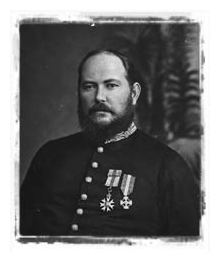John Forrest (1843-1918) John Forrest was an explorer and politician. Regarded by proponents of Federation
as the chief stumbling block to Western Australia joining the Commonwealth
as one of the original States, he was also widely criticised as the person
who helped bring Federation about.
John Forrest was an explorer and politician. Regarded by proponents of Federation
as the chief stumbling block to Western Australia joining the Commonwealth
as one of the original States, he was also widely criticised as the person
who helped bring Federation about.Born in Bunbury to Scottish parents, John Forrest rose to become Australia's first native-born peer when he was made Baron Forrest in 1918. He began his career in the Surveyor-General's Office in 1863 when he was apprenticed to the assistant surveyor in Bunbury, and it was as an explorer and surveyor that he achieved fame in Western Australia, the eastern colonies of Australia, and in London. In 1869 he was offered the leadership of a party to search for the lost Leichardt expedition party through an unexplored region near modern-day Laverton. His next expedition in 1870 was the first west to east crossing of Western Australia by land, following and surveying the route taken by John Eyre when he walked across the Nullarbor in 1840. In 1874 Forrest led another expedition from Geraldton, travelling west to east through the arid western centre to the north-south telegraph line in South Australia. The next year he travelled to London where he gave several public lectures and received popular acclaim as a colonial explorer. Back in Western Australia, Forrest received a free grant of 2000 hectares of land, and in 1876, married Margaret Hamersley, from one of the colony's wealthiest families. When he was appointed Surveyor-General in 1883 he was also given a seat in the Legislative and Executive Councils - at that time appointed advisory bodies to the Governor. By the time Western Australia was granted its own Constitution and with it responsible government in 1890, Forrest had positioned himself to become the colony's first Premier, a post he held for the next decade. Forrest's period in office coincided with the discovery of gold in Coolgardie (1892) and Kalgoorlie (1893). He sought to make use of the boom to provide the colony with those public works which previous administrations had been unable to afford. To do this he raised large loans in London, taking public debt from 1.4 million in 1890 to 12.2 million pounds in 1900. With an expanding population and increased government revenues the colony was able to pay the increased interest on these new loans. They paid for projects like the dredging of a new harbour at Fremantle, the laying of hundreds of miles of railway, and the construction of the Coolgardie Water Scheme. Forrest supported the establishment of a federation based on interstate free trade and a strong Senate to protect State rights. However there was much concern among his largely conservative coastal and rural support base that Federation would come at a high financial and economic cost. At the same time Forrest had to deal with the demands of the newly arrived miners on the goldfields, who constituted roughly one third of the colony's population. He was unsuccessful in his attempt to win more concessions for Western Australia, so he cut his losses and led the 'Yes' campaign in the referendum on the grounds that any future deal offered to Western Australia might be worse. In 1901 Forrest resigned as Premier and entered the new Commonwealth Parliament as the member for Swan. He was Postmaster General in 1901, Minister for Defence (1901-03) responsible for sending Commonwealth forces to the last stages of the Boer War, Minister for Home Affairs (1903-04) and Treasurer in five governments between 1905 and 1918. As Treasurer he helped establish the financial arrangements between Commonwealth and States which lasted until 1927. Forrest died in 1918 on board the troopship Marathon off the coast of Sierra Leone while on his way to London for medical treatment. In the words of the historian Frank Crowley, "He had been a successful political broker and gardener in a small colony, but he lacked the vision or the ideology to become a statesman in the national scene, and in his wealthy old age he appeared to be more concerned with the conservation of Empire and privilege than the betterment of Australian society." [Crowley, F. Australian Dictionary of Biography. Vol. 8, p. 551] |
Please note: The content on this website is made available for archival purposes and may not meet the State Library of Western Australia's current standards for web accessibility, mobile device compatibility, historical accuracy and cultural sensitivity.